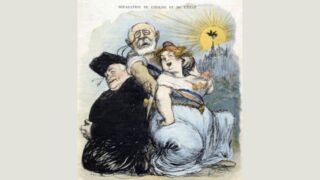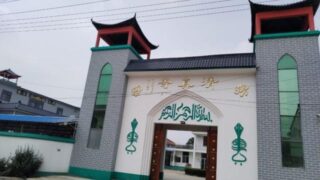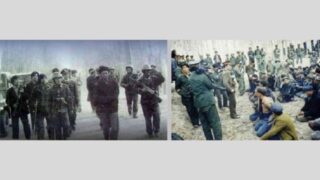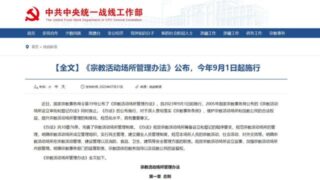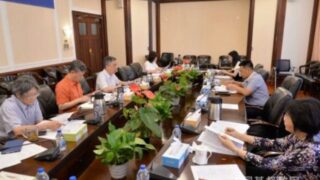As part of the campaign “to eradicate pornography and illegal publications,” the state targets religious venues, imposes more bans on publications.
by Gu Qi
Controlling free speech and the printed word is one of the ways the CCP is suppressing religious belief. Since March 2018, online and retail sales of Bibles have been banned in China, and hymn books or other spiritual readings aren’t allowed in churches unless sanctioned and published by the government.
In August, Fengzhuang Three-Self Church, located in Erqi district of Zhengzhou city in the central province of Henan, displayed banners and panels promoting the campaign to “eradicate pornography and illegal publications,” causing distress to believers who consider such a thing shouldn’t be done in a sacred place.
“The government’s campaign to ‘eradicate pornography and illegal publications’ has actually swept into churches. This is slanderous to God!” said one of the church’s co-workers.




“This isn’t just slanderous, but is a trap laid by the devil to make people mistakenly believe that there is a severe problem with the church’s ethos,” another believer added angrily.
“Eradicating pornography and illegal publications” (掃黃打非, saohuang dafei) is one of the Chinese authorities’ methods for managing the cultural market. Saohuang (meaning literally “sweep away the yellow,” as yellow can refer to porn in the Chinese language) refers to eliminating books and online information that contains pornographic content. Dafei (meaning literally “strike down the illegal”) refers to efforts to combat illegal publications.
Earlier in the month, the Religious Affairs Bureau of Zhengzhou city’s Erqi district convened a meeting of the persons in charge of religious venues, demanding them to display information promoting the campaign against illegal publications in their places of worship.
In an open letter from the Chongyang county government in the central province of Hubei, titled All People Must Take Action and Fully Carry Out Work to “Clean Up Gang Crime and Eliminate Evil” and “Eradicate Pornography and Illegal Publications” in the Religious Field!, “dark and evil forces” and “pornography and illegal publications” are associated with religious belief.ì


The letter calls for the control of “harmful information” online, which is defined as “publications and information that weaken, distort, or negate the Party’s leadership or China’s socialist system.” The censorship also covers the dissemination of “religious internal informational publications” and audiovisual products in public places.
Sermons and speeches by the clergy in religious venues that violate CCP’s religious policies and regulations are considered violations, so is the holding of religious activities outside the approved places of worship, and other “circumstances that affect ideological security and stability in the religious field.” The open letter also encourages people to report such “illegal” behavior.
The three provinces of northeastern China have also launched campaigns to “eradicate pornography and illegal publications” targeting religious venues. Many believers have reported that the Three-Self churches to which they belong have been subjected to sudden inspections by the government. All newspapers, hymnbooks, gospel leaflets, and especially Bibles that weren’t published and printed by the state were confiscated and even burned.
In April, Fengyang Road Three-Self Great Church, located in Sujiatun district of Shenyang city in the northeastern province of Liaoning, was fined 10,000 RMB (about $ 1,400) after South Korean versions of the Bible were found. The church was also prohibited from selling Bibles.


In August, a printing house in Liaoning’s Shenyang city was reported and investigated for printing Buddhist materials. Through bribes and connections, the printing house managed to avoid sanctions.


Those found in possession of foreign books that are not approved by the government face even more severe punishment. In May, Mongolian-language books and publications from Singapore were found during a search of a Three-Self meeting venue in Horqin town in the Hinggan League of Inner Mongolia. A church member said that all books without covers or those without publisher information were confiscated. The person in charge of the venue was demoted for “poor management” because the government treated the issue as a case of “foreign religious infiltration.”



